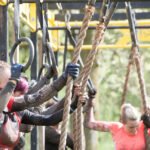How to Train for an Urban Obstacle Race with Limited Time
Training for an urban obstacle race like Metro Dash® with limited time requires a strategic approach to maximize efficiency and effectiveness. Here’s a comprehensive guide to help you prepare effectively:
1. Set Clear Goals and Priorities
- Define Your Objectives: Determine what you want to achieve from the race, whether it’s completing all obstacles, achieving a specific time goal, or simply finishing strong.
- Assess Your Available Time: Be realistic about how much time you can dedicate to training each week, considering work, family commitments, and other obligations.
2. Focus on Functional Fitness
- Understand the Demands: Obstacle races require a blend of strength, agility, endurance, and mental toughness. Tailor your training to simulate race conditions as much as possible.
- Incorporate Functional Exercises: Focus on compound movements that mimic race-specific actions, such as squats, lunges, pull-ups, and core exercises. These build overall strength and prepare you for obstacle challenges.

3. Create a Structured Training Plan
- Prioritize Key Workouts: Schedule 2-3 focused workouts per week that target different aspects of fitness (strength, endurance, agility).
- Interval Training: Incorporate high-intensity interval training (HIIT) sessions to improve cardiovascular fitness and simulate the intensity of race segments.
- Long Runs or Rucks: Include one longer run or ruck session each week to build endurance and mental resilience for the race distance.
4. Maximize Training Efficiency
- Circuit Training: Combine strength and cardio exercises into circuit workouts to save time and maximize calorie burn.
- Short, Intense Sessions: Opt for shorter, more intense workouts that can be completed in 30-45 minutes, focusing on quality over quantity.
5. Practice Obstacle-Specific Skills
- Visit Local Parks or Gyms: Look for opportunities to practice specific obstacles like rope climbs, wall jumps, or monkey bars.
- Technique and Efficiency: Focus on mastering efficient techniques for each obstacle to conserve energy and minimize time spent on challenges.
6. Nutrition and Recovery
- Balanced Diet: Fuel your body with a balanced diet rich in lean proteins, complex carbohydrates, and healthy fats to support training and recovery.
- Hydration: Stay hydrated throughout the day and during workouts to optimize performance and aid recovery.
- Rest and Recovery: Prioritize adequate sleep and rest days to allow your body to recover and adapt to training stress.
7. Mindset and Mental Preparation
- Visualize Success: Use visualization techniques to mentally rehearse completing obstacles and crossing the finish line with confidence.
- Stay Positive: Maintain a positive attitude and focus on progress rather than perfection, especially when time constraints make training challenging.
8. Adapt and Adjust
- Monitor Progress: Regularly assess your training plan and adjust based on your performance, strengths, and areas for improvement.
- Be Flexible: Life can be unpredictable. Adapt your training schedule as needed to accommodate unexpected changes without sacrificing consistency.
9. Join a Training Group or Community
- Support and Motivation: Training with others can provide accountability, motivation, and valuable tips for navigating obstacles and overcoming challenges.
10. Race-Day Preparation
- Simulate Race Conditions: Before the race, practice a mock race-day routine including warm-up, nutrition strategy, and mental preparation.
- Review Course Map and Rules: Familiarize yourself with the racecourse, obstacle locations, and any specific rules or requirements provided by race organizers.
By following these strategies, you can effectively train for an urban obstacle race like Metro Dash® even with limited time. Consistency, efficiency, and smart planning will help you maximize your training efforts and prepare you to tackle the challenges of race day with confidence. Remember, every workout counts towards your goal, so make the most of the time you have available and enjoy the journey to race day success!



